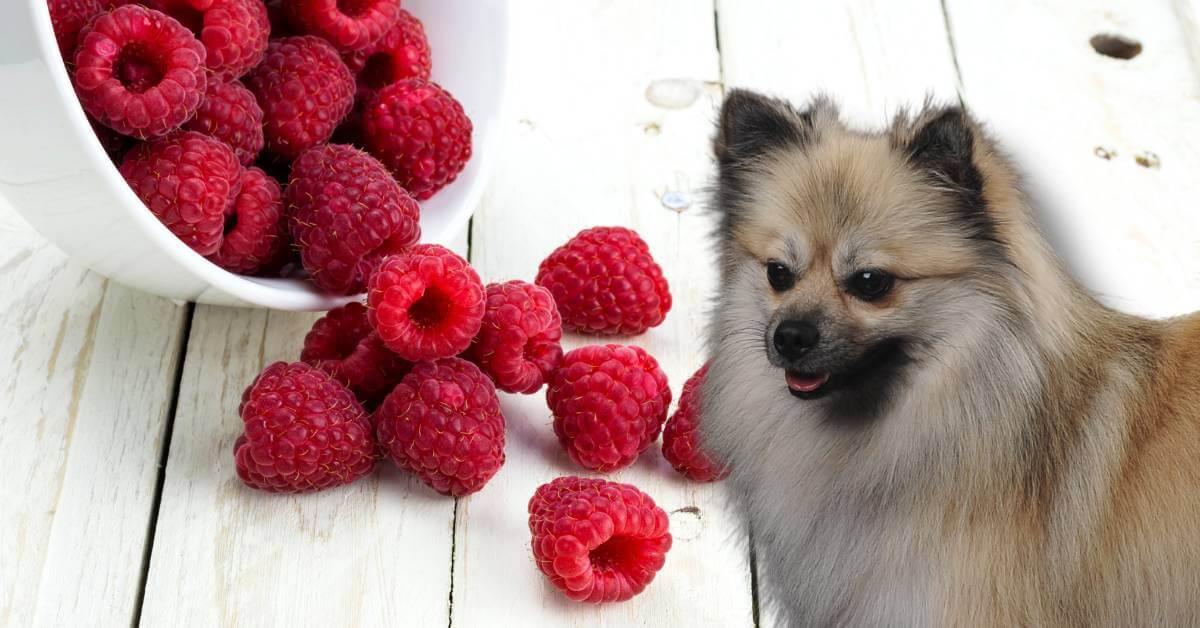Can Dogs Eat Raspberries?
Yes, dogs can eat raspberries! They are non-toxic and perfectly safe, although they are very high in fiber, so you shouldn’t give your dog too much. Like most fruits, they are high in vitamins and can be a healthy addition to your dog’s diet, but only in moderation.

Raspberries are tasty, sweet, refreshing, and one of the most popular fruits in my household. We buy them fresh every summer and freeze them to use throughout the year in smoothies, with oats, or just eat them in fruit bowls. My dog doesn’t like them; they are a bit sour, though. But I had to check just how safe raspberries are before ever deciding to share them with him. I learned that they are perfectly safe, even though they contain one of the most dangerous natural sweeteners for dogs!
Raspberries contain xylitol. Does this mean that they are dangerous for dogs?
Even though raspberries do contain xylitol, approximately 400 μg per 1.0g of fresh weight, this is such a tiny amount that your dog won’t get xylitol poisoning from raspberries!
Xylitol is a natural sugar alcohol usually extracted from birch bark or corn cob. Some fruits and vegetables also have xylitol, such as raspberries, strawberries, and plums. These concentrations are not even mildly dangerous for dogs, so please don’t worry.
Are raspberries good for dogs?
Raspberries are a healthy fruit with plenty of vitamins and minerals that can be good for dogs. But here’s the thing—dogs don’t need a lot of fruit or fruit sugar in their diet. A little bit now and then as a treat is fine if they like it, but don’t go overboard.
Vitamins and minerals
Raspberries are rich in vitamins and minerals, like vitamin C, folic acid, and manganese. These are all healthy and can contribute to your dog’s overall health, but they are not a magic superfood, so please don’t overdo it!
Antioxidants
One of the great things about raspberries is that they are rich in antioxidants. Antioxidants are important for boosting overall health and keeping us and our dogs vital and strong, especially during old age.
Low-calorie sweet snack with fiber
Raspberries are naturally sweet but low in calories, which makes them a pretty great treat. Plus, they’re full of fiber, which helps with digestion and keeps things running smoothly. If you give your dog a few raspberries as an occasional reward, that’s great—just don’t overdo it, as there are downsides to eating too much fruit.
How many raspberries can dogs eat and when are they not recommended
Dogs thrive on balanced nutrition that focuses on healthy proteins, fats, and carbohydrates. Their diet should come primarily from high-quality dog food that provides the essential nutrients they need to stay active and healthy. While fruits like raspberries are a nice and healthy treat, they are okay only in moderation. Here’s when they are not recommended.
Dogs with sensitive stomachs shouldn’t eat raspberries
Raspberries are not recommended for dogs with sensitive stomachs. These dogs often struggle with fiber and acidic foods, which can lead to digestive discomfort. Dogs with sensitive digestion may experience issues like gas, bloating, or diarrhea after eating high-fiber foods. The acidity in raspberries can also upset their stomach, as their digestive system is not as well-equipped to handle highly acidic or fibrous foods compared to less sensitive dogs.
If you have a dog with diabetes, please talk to your vet!
Even though raspberries are lower in sugar than some other fruits, they still contain natural sugars that can impact blood sugar levels, so if your dog is on a special regimen and food, please talk to your vet!
Diabetic dogs have trouble regulating their blood sugar, so even small amounts of fruit should be monitored. Fruit is always the best source of sugar, as the fiber will slow down the absorption of sugar, but it’s still best to limit the fruits when you can.
Can dogs eat raspberry-flavored products?
It depends on what the product is. Raspberries and the natural aroma and color of raspberries (such as when you use them for baking) are absolutely fine for dogs. However, some raspberry-flavored foods are not suitable for them.
Here are some examples of raspberry-flavored products that dogs shouldn’t eat:
- Raspberry-flavored jelly—not because of the raspberries, but due to the high sugar content.
- Jello, which often contains sugar or artificial sweeteners that aren’t good for dogs.
- Ice creams and cakes with raspberries, as they are usually loaded with sugar, dairy, and other ingredients that are not ideal for dogs.
- Any candy that is highly processed and contains sugar or artificial sweeteners.
So, raspberries, like strawberries, blueberries, and other fruits such as apples and peaches, can be a good food topper for your dog and a great snack! Just make sure only to give them a few and see how they like it!
Love, life, and fur forever!
FAQs
Can dogs eat frozen raspberries?
Yes, dogs can eat frozen raspberries. Frozen raspberries are hydrating and refreshing and can be a great treat on hot summer days! Give your dog a few and see how they react, as frozen fruit can sometimes upset their stomach, especially in small dogs.
Can dogs eat wild raspberries?
Yes, dogs can eat wild raspberries, as long as they’re picked from a safe, pesticide-free area and you know what you’re doing. Wild raspberries have the same benefits as store-bought ones, but make sure your dog doesn’t eat other potentially toxic plants that might be growing nearby. Please be careful and only try this if you have experience!
Can dogs eat dried raspberries?
Dogs can eat dried raspberries, as they are not toxic, but they really shouldn’t. A simple rule to follow is that dogs shouldn’t eat any dried fruit, as it is high in sugar and often has added sugar, coatings, flavors, and aromas.